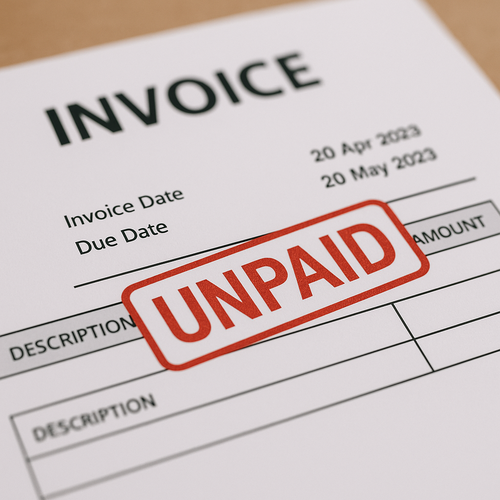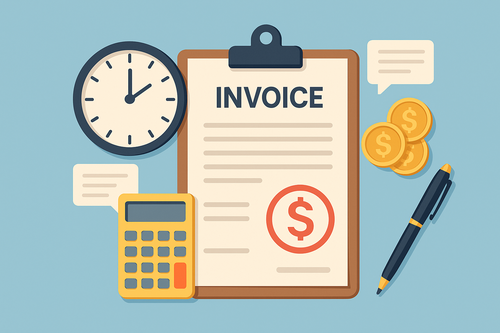Let’s face it — pinging someone about money they haven’t sent yet can feel just as awkward as bringing up politics at a dinner party. But if you’re handling client work, freelancing, or growing your business, it’s something you can’t afford to avoid (literally).
Every unpaid invoice is money you’ve already worked for. It’s not a favor — it’s what’s rightfully yours. And not following up can quietly put your business in the red. Sending a reminder doesn’t make you annoying. It shows you’re on top of things and value your time and effort.
When Exactly Should You Follow Up About a Late Payment
Timing is everything when it comes to chasing an outstanding charge. Drop a message too soon, and it might seem a little aggressive. Leave it too long, and it could get lost in the client’s endless inbox scroll.
A sweet spot? Usually 48–72 hours after the original due date. That’s soon enough to show you’re keeping tabs, but late enough to give the benefit of the doubt. Sometimes folks are just swamped or genuinely forgot — life happens. A gentle follow-up can put everything back on track with minimal awkwardness.
Why the Way You Write Matters More Than You Think
| Guideline | Explanation |
|---|---|
| Avoid harsh, robotic messages | Cold, outdated collection-style notes are off-putting and often ignored |
| Choose a warm, direct, and clear tone | Your tone reflects your brand — sounding human builds connection and trust |
| Be firm without being stiff | You can enforce boundaries while still sounding approachable |
| Use humor or kindness if it fits your style | A light, personal touch often increases positive responses |
| Avoid all-caps templates | ALL CAPS feels aggressive and impersonal, discouraging engagement |
Common Pitfalls That Make Late Payment Emails Fall Flat
It’s easy to write a reminder. It’s also easy to mess one up. And a clumsy message can slow things down even more — or burn a bridge.
Here are a few usual suspects you’ll want to avoid:
- Being vague (missing key details like amount or invoice ID)
- Coming off too intense or passive-aggressive
- Not including how or where to send the funds
- Sounding like a bot
- Following up way too often — or not at all
Getting paid isn’t just about asking — it’s about how you ask. Keep it clear, respectful, and easy to act on.
How to Send a Friendly Yet Firm Message That Gets Results
Crafting a great follow-up email is part art, part science. You want to sound like a pro, not someone pleading for money — but still get things moving.
Start with a short, pleasant intro. Then mention what’s open (include the billing ID and due date). Follow it up with a link or clear instructions to settle the amount. Wrap up with a thank-you and a line inviting questions, just in case.
Here’s a useful layout to guide you:
- Light, approachable opener
- Mention the balance still waiting to be paid
- Reference the charge and when it was due
- Offer a simple way to complete the transaction
- End on a polite and open note
No drama. No pressure. Just a well-structured message that makes it easy to say, “Oops, let me take care of that.”

Examples of Past Due Messages That Actually Work
Need some plug-and-play samples? Here are a couple of messages that strike the right tone — human, direct, and action-oriented.
Sample 1: Casual and Friendly
Subject: Quick heads-up – Billing ID #4579
Hey [Client’s First Name],
Hope all’s going great! Just checking in on that outstanding invoice (#4579) that came due a few days back. Totally get how things can slip — happens to the best of us.
Here’s a handy link to sort it out whenever you have a moment: [Payment Link]
Let me know if you need anything from my side.
Cheers,
[Your Name]
Sample 2: Respectful and Professional
Subject: Friendly Follow-Up – Open Invoice #4579
Hi [Client’s First Name],
Just wanted to send a quick reminder that invoice #4579 (due on [date]) still shows as unpaid on my end.
If you’ve already handled it, no worries at all. But if not, you can use this secure link to wrap it up: [Payment URL]
Feel free to reach out if you need the invoice resent or have any questions.
Appreciate your time,
[Your Name]
These messages don’t nag — they guide. And because they feel personal and easy to respond to, they often get quicker replies and faster payments.
